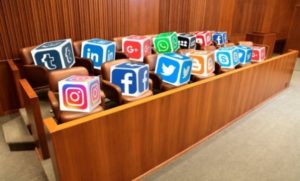To Google or Not to Google?
October 15, 2019
 As attorneys, we go to great lengths to select the jury who will decide our client’s fate at trial – yet today, there is a looming, additional silent juror banging at the door attempting to, and sometimes succeeding in, getting in – Google and the age of information overload.
As attorneys, we go to great lengths to select the jury who will decide our client’s fate at trial – yet today, there is a looming, additional silent juror banging at the door attempting to, and sometimes succeeding in, getting in – Google and the age of information overload.
Earlier this month a Broward County criminal defendant requested a new trial based on juror misconduct. Defendant, Dr. Scott Strolla, was convicted of video voyeurism and after the trial was over, one of the jurors contacted the prosecutor and advised that she had “researched” the defendant.
This phenomenon has become all-too common in our society. In 2016, a Florida defendant in a criminal case, who was convicted of first-degree murder, was also granted a new trial after a juror looked up definitions on his phone during trial. In fact, in that case the juror was charged with contempt of court and spent eight days in jail!
Further, in 2010 both the West Virginia Supreme Court of Appeals and the Nevada Supreme Court granted new trials to defendants based on jurors either contacting the defendant through MySpace or googling information about the type of injuries suffered by the victim in the case.
In fact, according to a Reuter’s report, since 1999 there have been at least 90 verdicts which have been the subject of challenges based on juror misconduct and inappropriate outside research.
So what is the solution? How do we keep that silent, but dangerous 7th or 13th juror out of the deliberation room? Jurors are continuously and strenuously instructed by Judges in every courtroom in the United States that they are not allowed to conduct any outside research. For example, Florida has actually enacted standardized jury instructions addressing this exact issue – “I want to stress that you must not use electronic devices or computers to communicate about this case, including tweeting, texting, blogging, emailing, posting information on a website or chat room, or any other means at all. You must not do any research … or use a computer, cell phone, the Internet, or any electronic device to get information related to this case or the people involved in this case.” FLA. CIVIL STANDARD JURY INSTRUCTION §202.2.
However, despite these stern instructions, we know that unfortunately some jurors may still conduct outside research. This technology has been recognized as “addictive.” For now, we must continue to emphasize the importance and sanctity of the judicial process and trust jurors will follow the Judge’s instruction.
(This post was prepared by Kimberly L. Wald, Esq. Kim is a trial attorney at the Kelley|Uustal Law Firm in Fort Lauderdale, FL. For more information, please contact Kim at klw@kulaw.com)
